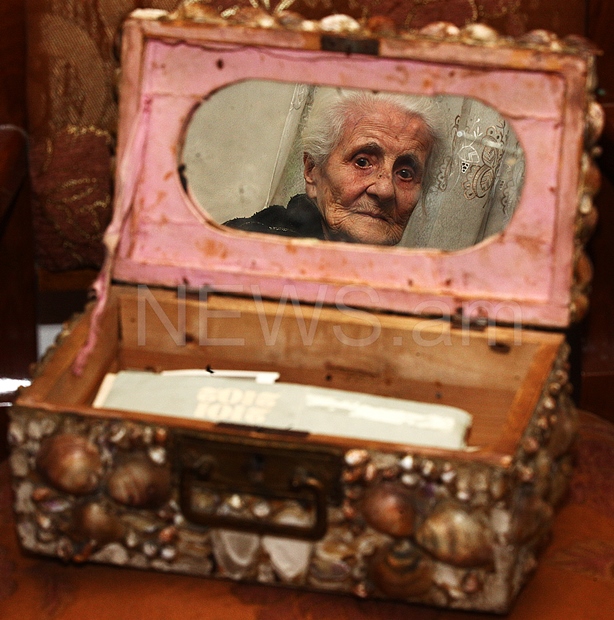By Ani Afyan
Armenian News-NEWS.am continues publicizing stories within the framework of the “Survivors” project, which is launched ahead of the centennial of the Armenian Genocide perpetrated in the Ottoman Empire between 1915 and 1923.
“Survivors” is the stories of ordinary Armenian people who lost their childhood and homeland.
“Survivors” is one hundred years of recollections and pain, and one hundred years of expecting reparation.
“Survivors” is a diminishing group of people who will not lose their hope for the acknowledgement of their pain.
“Survivors” is 103-year-old Silvard Atajyan.
You always want to open a closed jewelry box. Especially, an ancient jewelry box with sea scallops, and which probably keeps a lot of secrets (PHOTOS). The sense of sensitivity, however, surmounts, and I patiently wait for the owners of the house.

“This is my grandmother’s jewelry box; this was given to her by her mother,” a young woman by the name of Nune said noticing my curiosity. “Today, the family archive photos are kept in it. If you want, you can take a look. My grandma will come now and tell everything.”
And on these words, white-haired Silvard Atajyan, who has kept her dignity high up, appeared at the door. She passed the hall a bit slowly, and sat on her old armchair.
Sitting on the chair placed next to this elderly woman, I unintentionally saw a young man’s photo which was put underneath the glass of the tableware cabinet.
“Is this your grandson?” I said trying to start the conversation.
“Yes, but he’s no longer alive,” she whispered barely audibly.
“I’m sorry,” I said in shock, adding, for some reason, “everything is in God’s hands.”
“But is it right that I’ve lived so long, whereas he left us so early?” the old woman asked bitterly. “Just as God was unfair at that time, he remains unfair today, too.”
That “time” was one hundred years ago in 1915 when, disregarding the threats by the Turkish authorities, the residents of Armenian villages on the Mediterranean coast climbed Mount Musa (Musa Dagh) and organized a self-defense. These fighters for righteousness included Hayrapet and Maritsa Sherbetyan.
“My maiden name is Sherbetyan, but now I have my husband’s last name: Atajyan,” the woman explained.
She was born in 1912 in Yogunoluk village—in present-day Turkey. She was only three years old during those events.
“The Turks killed my [paternal] uncle and threw him into the river, whereas my father managed to escape,” she told what her parents had said. “We were defending for more than forty days.”
In the daytime, the women were standing, without fear, with their fathers, husbands and brothers. At night, however, they were slipping down the mountain without being noticed, and to collect grapes and figs to somehow provide something to eat for the fighting men.
Sometime thereafter, Silvard Atajyan was to notice that her future mother-in-law, Sima Atajyan, also was taking part in their defense of Mount Musa.
Day by day, however, it was becoming increasingly difficult to defend against the Turkish attacks.
“The strength [of the defending Armenians] was running out. One day our priest said: ‘If we run out of strength, all of us—from old to young—will throw ourselves into the sea.”
But one day, a French ship appeared on the coast.
“The [ship] captain noticed our white flag and lowered boats.”
The captain, listening to the story of the Armenians, ordered that all defenders be taken into the ship and taken to Egypt, to Port Said.
After the First World War, however, the Armenians again had the opportunity to go back to Mount Musa. But the Sherbetyan family, which already had settled in Aleppo, stayed in Syria. Hayrapet opened a small shop and set up a comb manufacturing business.
“We did not return with the others, but we often visited our house,” Grandma Silvard said. “We were seven children. I had three sisters and three brothers: Nazeli, Lusik, Mari, Sargis, Vardan, and Poghos.”
In 1935, Silvard married Hovsep Atajyan, who was an Armenian officer from Khdrbek viilage, and he was serving in the French army. In1937, the young family had their first child, and they named the boy Hovhannes. Soon thereafter, Silvard Atajyan moved to Beirut, Lebanon, with her family.
The time was going by, and the Mount Musa residents thought that gone are the days when they were ready to die for their native land. But soon everything changed, and their regular life “collapsed” in 1939.
“The French gave our lands to the Turks,” Silvard Atajyan said trying to hold back the tears in her eyes. “We could no longer travel home.”
In August 1947, however, the Atajyan couple decided to move to Armenia.
“At first, they settled in Etchmiadzin. But in 1947, my Grandpa Hovsep was tonsured and exiled to Vardenis,” Nune said continuing the family story.
In her words, Hovsep, before moving to Armenia, had burned all the documents fearing that he would be exiled to Siberia.
“We lived in Vardenis for five years. My husband was working in the collective farm, and I was weaving carpets. It was only in 1952 that they gave us land in [Armenian capital city] Yerevan, and in 1953, we built this house.”
“Aside from Hovhannes, three more children—Hakob, Sima, and Soghomon—were born in the Atajyan family.
Hayrapet and Maritsa Sherbetyan died in Aleppo; they could not move to Armenia, the elderly woman said brokenheartedly.
Then she added: “Solely I am left from my family.”
And in Nune’s words, on every third Sunday of September, Grandma Silvard cooks Harissa, the traditional food of the Mount Musa residents, for her grandchildren and relatives. Thus, she pays tribute to her father and the defenders of Mount Musa.
Photos by Arsen Sargsyan/NEWS.am
The previous articles in the “Survivors” project are:
Khosrov Frangyan: 100 years of expecting repentance
Arevaluys Amalyan: 100 years of expecting repentance
Margarita Mkhitaryan: 100 years of expecting repentance
Aharon Manukyan: 100 years of expecting repentance






























